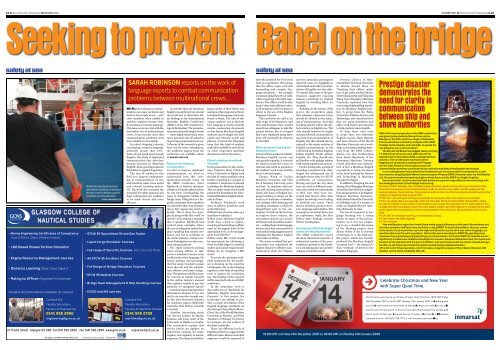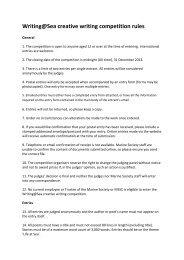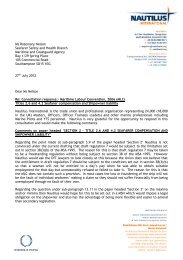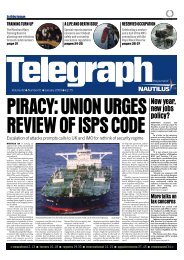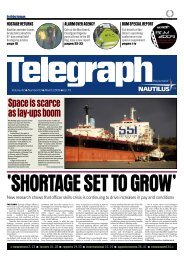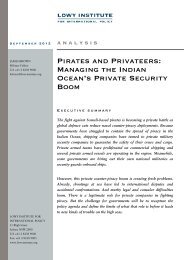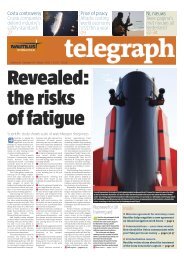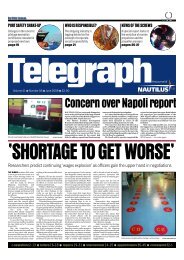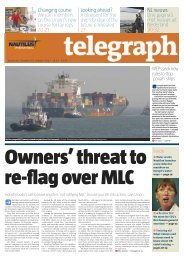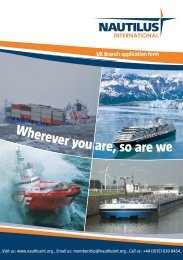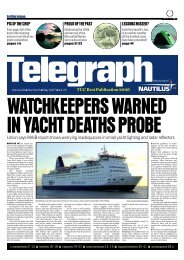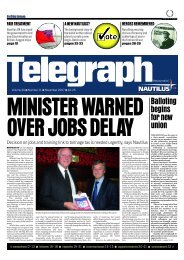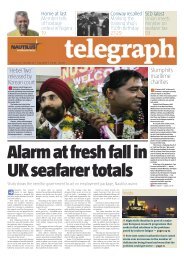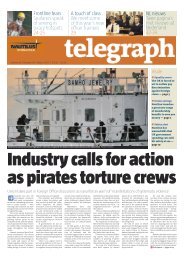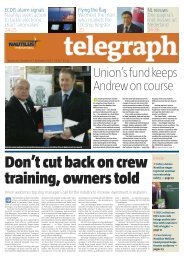December 2007.pdf - Nautilus NL
December 2007.pdf - Nautilus NL
December 2007.pdf - Nautilus NL
- No tags were found...
You also want an ePaper? Increase the reach of your titles
YUMPU automatically turns print PDFs into web optimized ePapers that Google loves.
24 ✪ ●<strong>Nautilus</strong> UK Telegraph ●✪ DECEMBER 2007DECEMBER 2007 ✪ ●<strong>Nautilus</strong> UK Telegraph ●✪ 25Seeking to prevent Babel on the bridgesafety at sea Researchers developing improvedinternational standards are looking atthe ways in which seafarers speak toshipmates and shore personnelPICTURE: DANNY CORNELISSEN SARAH ROBINSON reports on the work oflanguage experts to combat communicationproblems between multinational crews...WE ALL know that poor communicationcan cause accidents andleads to low morale at sea — withcrew members often unable tosocialise together because theydo not share a common language.This issue is not new, but with theinexorable rise of multinationalcrews, it has become clear thatcommunication problems needto be studied in more depth.In today’s shipping industry,‘not sharing a common language’generally means that crewmatesdo not speak good enoughEnglish. The study of shipboardcommunication has thereforebecome focussed on ‘MaritimeEnglish’: a fast-growing academicfield allied to applied linguistics.The aim of studies in thisfield is to improve understandingof communication at sea,and therefore create more usefuland relevant teaching materials.The work also increases thepotential for safety manuals andlegal information for seafarersto be made clearer and moreeffective.In October this year, MaritimeEnglish researchers from aroundthe world met to share their latestfindings at the InternationalMaritime English Conference(IMEC) at the STC nautical collegein Rotterdam. The presentationscovered a wide range of work— some highly theoretical, somemore practical, but all aimed atimproving communication at sea.A flavour of the research is givenhere, but for more information,the academic papers from theconference are available onlineat www.imla-imec.com.Research into shipboardcommunicationIn order to improve shipboardcommunication, we need tounderstand how this communicationactually works. Atthe IMEC conference, PeterBjörkroth of Sydväst maritimecollege in Finland explained howhe has been investigating theissue of ‘mitigation’ within thebridge team. Mitigation is a linguistictechnique where speakerstry and soften their way of speakingso they appear less harsh orhostile. This is done, for example,by using words like ‘could’ or‘should’, or by making a sentenceinto a question. Björkroth hadnoticed some examples wherethe use of mitigation rather thanplain speaking had caused confusionand led to accidents inthe airline industry, and he wonderedif mitigation was also commonamong seafarers.His study involved invitingsome serving officers to takepart in a simulator exercise so hecould monitor their language. Hefound, perhaps unsurprisingly,that the master tended to speakmore directly and the subordinateofficers used more mitigation.This pattern could be a causefor concern, as similar researchin the airline industry showedthat captains tended to pay lessattention to mitigated speech— sometimes ignoring importantinformation because it was notsaid in an assertive enough way.In the time-honoured mannerfor academic papers, Björkrothconcludes that further researchis needed.Another interesting studywas ‘Service Letters’, by SandraTominac and Josip Luzer of theUniversity of Rijeka in Croatia.The researchers explain thatservice letters are updates oninstruction manuals for ships’engines, sent regularly to marineengineers. The study assembled alarge number of these letters andused powerful computer softwareto analyse the language structuresfound in them. The aim of this‘corpus analysis’ was to find outhow language is used in real-lifemarine engineering documentsso that future Maritime Englishstudents can be taught the mostuseful and relevant words andphrases. It struck the Telegraphteam that this kind of analysiscould also usefully be carried outon other important maritimedocuments such as M-notices.Efforts to develop internationalstandardsIn his presentation to the conference,Professor Boris Pritchardof the University of Rijeka tookthe idea of corpus analysis a stepfurther, reporting on a project toestablish a minimum technicalvocabulary for Maritime English.This is a major study which couldprovide the foundation for internationalMaritime English standardsin future.Professor Pritchard’s workaims to address questions suchas the following:✪ What kind of words make up amaritime vocabulary?✪ How many Maritime Englishwords does a deck or engineroomdepartment rating or officerneed: (a) for support level, (b) foroperational level, (c) for managementlevel (STCW)?✪ How many ME words wouldbe appropriate for obtaining athree-year BSc degree in nauticalstudies and marine engineering?✪ How do we recognize a MEword?To create the minimum technicalvocabulary list, the professoris drawing on the expertiseof colleagues. He is also bringingtogether a wide body of maritimetexts to analyse for vocabularyuse. The findings of the researchwill be reported to the next IMECconference.In the meantime, work isalso underway on ‘Yardsticks forMaritime English AssessmentPurposes’. In this project, theresearchers are aiming to producea proper description of theEnglish language standards weshould expect from ship’s officers.Clive Cole, of the World MaritimeUniversity in Sweden, and PeterTrenkner, of Wismar Universityin Germany, are the authors ofthe draft ‘yardsticks’.There are different levels ofEnglish proficiency suggested fordifferent ranks. Masters and chiefengineers would be expected tosafety at seameet the yardstick for ‘Very GoodUser’ as a minimum. This meansthat the officer copes well withdemanding and complex languagesituations — for examplecommunicating fluently on radiowhile complying with radio regulations.The officer would be ableto give ‘clear and sufficient ordersin all situations’ and even instructothers in the use of the Englishlanguage onboard.The yardsticks are still in anearly stage of development, andCole and Trenkner have invitedinput from colleagues to take theproject further, but it is hopedthat some standards along theselines will eventually be adoptedby the IMO.Efforts to improve teaching andtesting techniquesJust as with any academic subject,Maritime English courses canvary greatly in quality. It is crucialfor tutors to make the course asrelevant and useful as possible tothe students’ work at sea, but thisdoesn’t always happen.Yanqiu Wang of DalianMaritime University and YifeiFu of Liaoning University pointout that: ‘In maritime universitiesand training institutions inChina, the focus of English languageteaching is always on themastery of maritime vocabularyand reading, while listening andspeaking constitutes a relativelyinsignificant part in the curriculum’.To find out the best wayto improve these courses, theresearchers carried out a surveyof Chinese and Australian seafarers— asking them what languagebarriers they had encountered atwork and inviting suggestions forchanging the Maritime Englishcurriculum in China.The survey revealed that pronunciationwas considered thebiggest obstacle to effective communication.Both the Chineseand the Australian participantsreported cases of struggling tounderstand each other’s pronunciationof English over the radio.To remedy this, some of the participantssuggested exposingtrainees extensively to ‘originalEnglish’ by watching films, forexample.Building on the results of thesurvey, the researchers arguethat adequate classroom hoursshould be allotted to the teachingof pronunciation. And thisteaching should reflect the globalvariation in English use. ‘Notonly should learners be taughtstandard British pronunciationand American pronunciation ofEnglish, but they should also beexposed to the major varieties ofEnglish pronunciations in theworld such as Australian English,Indian English, South AfricanEnglish, etc. They should alsoget familiar with pidgins spokenwith strong typical local accents.’On the testing side, a group ofCanadian researchers has challengedthe widespread use ofmultiple-choice tests for STCWcertificates of competency.Having surveyed the way thesetests are used in different countriesand carried out experimentsof their own, they were concernedthat factors other thansubject knowledge were leadingto artificial test scores. Thesefactors included question structure,language and intuition. Theresearchers stress that this is justan exploratory study, but theybelieve their findings warrantfurther investigation.Development of Maritime Englishcourses and teaching materialsThe IMEC conference wasn’tall about theoretical research. Asubstantial number of the presentationsreported on the handsonwork taking place at maritimecolleges around the world.Veronica Zykova of MurmanskState Technical Universityin Russia shared ideas on‘Teaching deck officer cadetshow to get radio medical advice’,while Chaojian Shi and YingmingWang from Shanghai MaritimeUniversity explained how theywere using shiphandling simulatorsfor Maritime English practice.A group from the TokyoUniversity of Marine Science andTechnology also described howthey are using simulators andother work-based environmentsto help students learn English.To help those who wantto create their own MaritimeEnglish courses, Inger Battistaand Anne Pazaver of the WorldMaritime University ran a workshopon creating teaching materialsfrom the IMO website.Advice was also forthcomingfrom Paula Manolache of theRomanian Maritime TrainingCentre. And there was a descriptionof how a Maritime Englishcoursebook is being developedat the Arab Academy for Scienceand Technology & MaritimeTransport in Egypt.In addition, Yongxing Jin andJieying Xie of Shanghai MaritimeUniversity described the compilationand promotion of an English-Chinese maritime dictionary,while Dušan Fabe of the Universityof Ljubljana told of a project tocreate an English-Slovene maritimedictionary in class.The use of computers in languagelearning was a strongtheme in many of the presentations,so it was not surprisingto see a detailed discussionof the MarEng project fromAlison Noble of the Universityof Antwerp. It is this high-profileproject which has recentlyproduced the Maritime EnglishLearning Tool — the online/CDRom ‘textbook’ reviewed in theOctober Telegraph.Prestige disasterdemonstrates theneed for clarity incommunicationbetween ship andshore authoritiesONE of the keynote speeches at the IMEC conferencewas given by two students: Berend Vree and IvoBezuijen of the STC maritime college in Rotterdam.Their presentation included an analysis of the 2002Prestige tanker disaster, pictured right, to assess therole played by poor communication.The 26-year-old Bahamian-flagged vessel, carrying77,000 tonnes of fuel oil, sank 120 miles off theSpanish coast in November 2002, causing extensivepollution. Vree and Bezuijen looked at severalfragments of conversation between the Prestigeand the Cape Finisterre shore station to see howcommunication problems contributed to the confusion and delay in dealing with the incident.In an exchange seven hours before the first distress call, the conversation is conducted in a calm,clear manner, using Standard Marine Communication Phrases (SMCP). However, after the first Maydaycall, the communication procedures begin to break down and the SMCP are largely forgotten.Some hours later, it can be seen that both parties are experiencing problems communicating, withthe messages unclear to the Prestige and too long.Finisterre Traffic: Prestige, this is Finisterre Rescue Centre, good morning. We have information thatthere are four peoples of your crewmembers, ready to return to your vessel, and the people are thesecond engineer, the electrician, the pumpman and one oiler. Are this four people enough to assist chiefengineer to start the main engine? Over.Pr: OK, OK, I am waiting to coming on board this some people. After how many hours coming?FT: No, sir, please listen my message, listen my message. There are four people, this people is ready,is ready to embark in your vessel, to come back to your vessel. The question is if the chief engineer hasenough with this four people to start the main engine, please ask chief engineer if consider he can startmain engine with the assistance of the second engineer, the electrician, the pumpman and one oiler.Over.Pr: OK, OK I am waiting to coming, I am waiting to comingFT: Yes, please ask chief engineer.Pr: Yes, momentVree and Bezuijen argue that it would have made a great difference in this case if the seafarers andthe shore operators had been more confident in using SMCP. To tackle this problem, they say, routineis the answer. If you were woken up in the night and asked to count to 10 in your native language, youwould be able to do this with no problem. ‘We feel the same should go for SMCP. By spending moreclassroom hours practising and graduating by oral examination, the level of SMCP of students will risesignificantly. Furthermore, seafarers should get an annual or biannual refreshment test; this could evenbe done on the ship itself with the use of a CD Rom. Just as fire drills create the routine needed during areal fire, so will these tests create the routine needed during a distress situation.’✪The full text of this presentation, which includes a linguistic analysis of the al Salam Boccaccio 98incident, can be found at www.imla-imec.com


